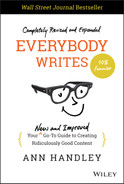58
Biased and Balanced
“There's a name for something with a single point of view: It's called a press release,” marketing veteran Joe Chernov once told me. (Joe is now the CMO of software company Pendo.io.)
Invite multiple perspectives into your content. At the very least, acknowledge that other points of view might exist; ignoring them makes your reader not trust you.
You can be biased and balanced. It sounds paradoxical, but it isn't.
Biased and balanced coexist even in traditional journalism.
“The New Republic was always a biased magazine,” author and journalist Dan Lyons said in an email interview. And so was Forbes, where Dan worked as senior editor.
“At Forbes we were not allowed to write stories that said, ‘On the one hand this, on the other hand that,'” he said.
“We were under orders to have an opinion, to take a side and defend it. But we were also expected to ‘fight fair,' meaning you should be honest, and acknowledge all the facts, and then say why you believe what you do.”
One hypothetical example might read something like this, Dan said:
Apple stock is a bargain right now, and you should buy it. Why? Apple is about to release a bunch of great new products in the second half of this year and when it does the stock will soar.
[The] counterargument is that Apple's growth has slowed, and some critics think it will never be a growth stock again. However, I think the new iWatch could sell XX number of units at XX dollars, and this would be a huge shot in the arm to Apple's revenues.
* * *
Does balanced and biased mean you should mention your competitors?
Sounds crazy, right?
It's not crazy. Comparing yourself with your competitors in an open, transparent way is a way to catapult trust. Your audience knows your competitors exist; they've probably been researching them, too.
So why not compare your products, services, or approach with that of your competitors? You explain the pros and cons. You show your audience what sets you apart in a balanced way.
It's a bold move. But a strategic one.
It'll build relationships. It'll earn you admiration. It'll set you apart. It says you know precisely who your ideal customer is. It says you recognize you aren't for everyone. And (bonus!) it just might save you time, because you'll repel the customer who is not a good fit for you.
Trust is everything. If there's a bolder way to tell your audience that you're watching out for them … I can't think of it.
P.S. Mentioning a competitor does not mean calling out a competitor for a misstep. Criticizing a competitor is most definitely a bad idea. Don't do it. It might momentarily feel good. But you will look small and petty, with a mean little heart of stone.
